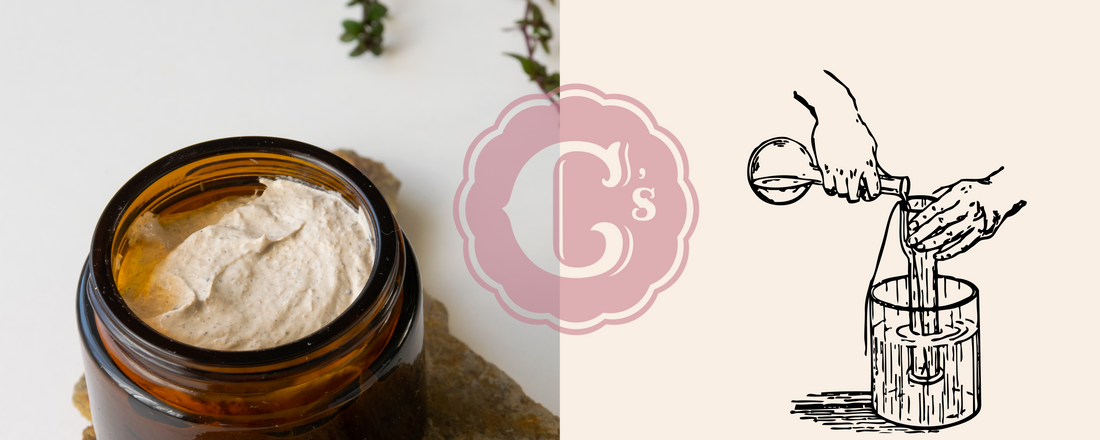What Exactly Are 'Chemicals' in Skincare? Sweet Cecily's Explore.......
The world of skincare can be one that inspires confusion and a real felt sense of elitism. The products we use can often contain ingredients with scientific names that are not easily understood by anyone except those in the industry.
Here at Sweet Cecily’s, we want to change that by bringing you into our world and providing a helping hand in order for you to understand some of the terms and jargon used within the skincare field. We want to aid your understanding of the ingredients used and what purpose they serve and how to tell the difference between a material that sounds harmful and an ingredient which is potentially harmful to your skin.
One of the key terms that I (Dorrie) hear being used when talking about what to avoid when looking down the list of ingredients in your chosen skincare product is the dreaded ‘chemicals’. Whilst some chemicals are most certainly harmful (you wouldn’t wanna rub cyanide all over your face… Or anywhere else for that matter!) most ‘chemical’ sounding ingredients are perfectly safe for the skin and are often derived from plants.
A chemical is literally anything that consists of matter; whether that is a gas, a solid or a liquid and can either be created synthetically or occur naturally. Chemicals are found absolutely everywhere including the food that we eat such as fruits and vegetables. The protein and carbohydrates that are found in these foods are known as chemical compounds, even the peel on your beloved potato wedges contain glycoalkaloids which is a known toxin. The key here is to learn what is a harmful chemical and what isn’t, rather than relying on blanket terminology.
Some ‘chemicals’ used in natural skincare can sound intimidating but there is a need to use certain compounds in order for an oil and water-based formula (a face cream for example) to stabilise - meaning all the active ingredients are able to continue functioning in the way they are intended to. For example, I think we all probably know that oil and water typically do not mix, so we need to use an ingredient that will combine the two seamlessly. Another essential ingredient for water-based creams is preservatives, which, like the word chemical, has gotten a bad reputation over the years.
A preservative is a necessary element when making any skincare formulation that contains water, as the presence of water can allow bacteria to grow and lead to the product going off or becoming unsafe. Our lip balms are one of the products that do not require any preservatives and that is because they do not contain water. Fun fact - the Beeswax contained in the lip balms does also naturally preserve them to a certain degree. All our products here at Sweet Cecily’s have undergone rigorous testing and each have their own Cosmetic Safety Report - also known as a Cosmetic Safety Assessment.
These assessments include testing for bacteria, the stability of the product and also checking that our formulations are completely safe to use on the skin. They will then advise whether this product is suitable for sale. We then collate all of this information and file a notification to the Cosmetic Safety Regulation who will then approve or deny the request. None of our products have ever received a negative report and have all been approved by the relevant regulations. Now we’ve got the basics out of the way, we can move on to what ingredients we use, what they are made from and why we use them.
-
What is Sodium Stearoyl Lactylate?
- this ingredient is typically known as an emulsifier. The primary use for this is in oil and water-based formulas such as our face creams, body butters and hand creams. It stops the oil and water elements from separating. It is an approved food additive which is Vegan, biodegradable and completely non-toxic. It is a natural ingredient which is widely used in the skincare industry and actually derived primarily from Coconuts!
-
What is Glyceryl Stearate SE?
- Glyceryl Stearate SE is fatty acid derived from vegetable or soy oil and is also naturally produced in our bodies. The ‘SE’ part stands for ‘self emulsifying’. It is also used as an ‘emollient’ which basically means it can help form a protective barrier on the skin, slowing down the loss of moisture. Glyceryl Stearate SE is also Vegan friendly and completely safe for the skin.
-
What is Stearyl Alcohol?
- this ingredient is naturally found in many plants and even in our own bodies. Although the term ‘alcohol’ when used in terms of skincare is enough to make you shudder, this kind of alcohol is one that should be praised rather than condemned! This alcohol differs from denatured alcohol which can cause drying when it comes into contact with the skin. Stearyl alcohol is primarily used as an emollient to soften the skin and also as an emulsifier, to combine oil and water. It is completely safe to use and is 100% Vegan.
-
What is Caprylyl Glycol?
- this ingredient is known as an alcohol - before you panic it is an alcohol derived from fatty acid often found in Coconut oil, which means it is not the type of alcohol (denatured) that causes the skin to dry. Caprylyl Glycol is a humectant which means it helps to attract and hang on to moisture. This makes it particularly useful in any formulations to keep your skin hydrated! It is generally combined with Phenoxyethanol to form a preservative
-
What is Phenoxyethanol?
- Phenoxyethanol is commonly combined with Caprylyl Glycol to be used as a powerful, non toxic, paraben free preservative. Using a preservative in any skincare product that contains water is essential, because water can be a breeding ground for bacteria and fungus. This ingredient helps maintain the stability of a product whilst also making sure it doesn’t prematurely spoil. Whilst it can be synthetically produced, it actually naturally occurs in Green Tea! You will find this ingredient in most makeup including foundation. Phenoxyethanol is biodegradable, 100% Vegan and has been shown to be safe to use in cosmetic products.
-
What is Sorbitol?
- this ingredient is commonly used as a humectant which means it will draw and keep a hold of water, meaning it will prevent the loss of moisture on the skin. It can also be used as a thickener to adjust a cream's consistency. Sorbitol can be found in apples, pears and also in corn syrup! It is 100% Vegan and is completely non-toxic as it is even used as a sweetener in some food products!
-
What is Vegetable Glycerine?
- Vegetable Glycerine is commonly made from Coconut or Soybean oil. As the name suggests, it is completely Vegan friendly and contains no animal derivatives. It is extremely popular in the cosmetic industry as using this liquid in skincare products can have a positive effect on our skin's health. Glycerin is a humectant which means that it can pull water from the deeper layers of the skin and bring it to the surface, resulting in added skin moisture. As vegetable glycerine is thick in consistency, it can create a protective barrier on our skin to protect it from damage
Conclusion: I (Dorrie) have handmade our creams for around 10 years now and as a result have learned a lot about formulating safe, non toxic, vegan friendly skincare products. When I first started working at Sweet Cecily’s, a lot of the jargon used would deeply confuse me and I had no idea why we would need to add anything that didn’t sound natural to our creams.
Over time, I came to understand the necessity of these ingredients and accepted that just because a material sounded harmful, didn’t mean that it in fact, was. My advice would be to carry out your own research or if in doubt, email a company directly and ask what the ingredients are. Always make sure that you are buying from reputable companies whose products have been registered with the Cosmetic Safety Regulations.
Whilst this is an essential, non-negotiable element in order to sell skincare products to the public, many companies manage to dodge this crucial step. Finally, please do not hesitate to get in touch with me or Sweet Cecily’s team if you have any questions or queries about our products or their ingredients.

